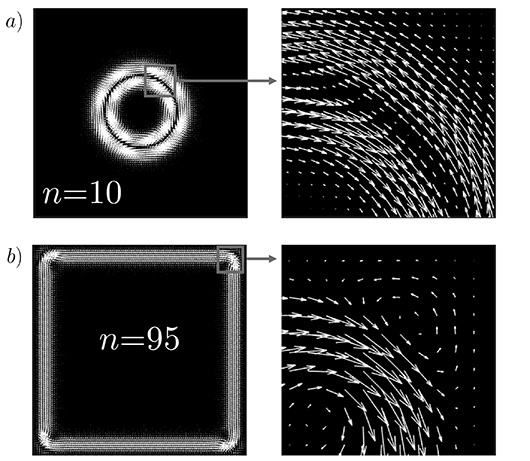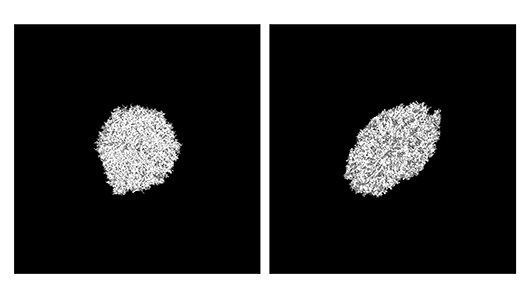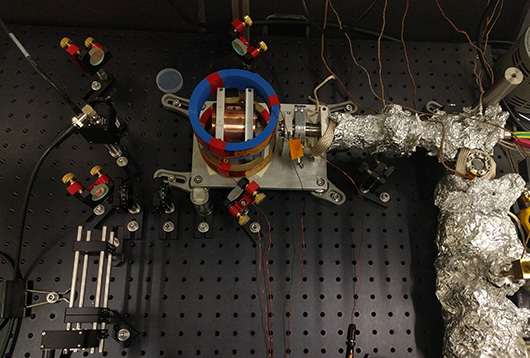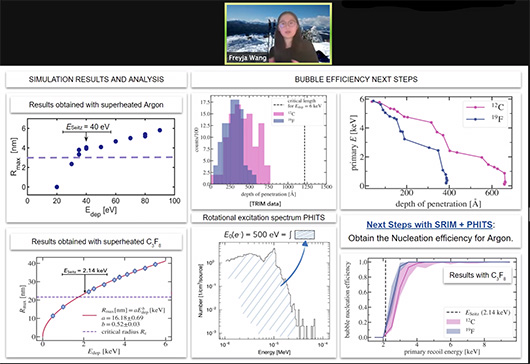Students convert physics lessons to practical use with undergraduate research projects
In the weeks leading up to her poster presentation at the Canadian Conference for Undergraduate Women in Physics, second-year student Freyja Wang reflected on the importance of working on a real-world experiment outside of a classroom context.
“Research itself is much messier than the neat results presented in our textbooks, but the challenges in research give an extra weight to science,” she said. “It’s what makes a discovery so exciting.”
The Department of Physics at the University of Alberta provides undergraduate students with opportunities to build on knowledge gained in physics lectures and labs with summer research projects.
Supervised by professors who are active researchers, undergraduate summer research projects allow students to gain a deeper understanding of physics principles, contribute to the global pool of scientific knowledge, and develop technical and critical thinking skills that can be applied to careers in any field.
Asad Bhuiyan: Discovering Theoretical Research

Asad Bhuiyan’s first undergraduate physics project was to study the quantum mechanical treatment of an electron in a uniform magnetic field and how it is affected by the presence of boundaries.
Quantum mechanics was a required course for engineering physics student Asad Bhuiyan. The class, taught by professor Frank Marsiglio, ultimately influenced a change to Bhuiyan’s career plans.
“I found the course content super-interesting and so pursued a research position under him to get a feel for what real quantum mechanics research was like,” says Bhuiyan. “I ended up liking theoretical physics quite a bit.”
Bhuiyan became lead author on academic papers based on the research he did with Marsiglio.
“My first project was a computational study in quantum mechanics. I calculated and analyzed properties of single electrons confined to 2D quantum dots immersed in spatially uniform magnetic fields. Dr. Marsiglio had already been pondering this problem when I had applied to work with him,” Bhuiyan says. “ My second project was an exploratory study in time-dependent quantum theory and solid-state physics. I calculated and analyzed properties of single electrons in periodically driven 1D finite tight-binding potentials. I became interested in working on this topic after reading some literature online and proposed an independent summer project to Dr. Marsiglio.”
Bhuiyan’s research journey could describe his career journey. “Working on this project kind of felt like travelling through a maze, says Bhuiyan, who plans to pursue a PhD in theoretical condensed matter physics. “Unlike a maze however, an ‘exit’ or interesting outcome was never guaranteed from the start.”
Rebekah Hall: Modelling Magnetic Effects

Rebekah Hall studied of the effect of magnetic fields on yeast colonies.
For a summer research project, Rebekah Hall used a type of scientific modelling that was only briefly mentioned in her classes.
“Lattice-based models are not something that is touched on very much in my courses, so I really enjoyed having the opportunity to learn about a topic I wouldn’t otherwise engage with,” Hall says. “I also got a lot of experience with programming, which is a skill I previously knew little about.”
The project, a study of the effect of magnetic fields on yeast colonies, is the subject of a paper to be submitted for publication on which Hall is the lead author. She previously co-wrote a book review with the project’s supervisor, assistant professor Daniel Charlebois, for the prestigious journal, The Quarterly Review of Biology.
“While budding yeast is a relatively simple organism, by learning more about how magnetic fields influence how it multiples, we can start to learn more about how they influence more complex organisms, such as ourselves,” says Hall, who is continuing to work on the project as a research assistant. ”Given the importance of magnetic fields in medicine, this can be very useful.”
Timothy Lee: Toward a Quantum Internet

For his summer research project, Timothy Lee helped to build an apparatus that could be used in quantum computing.
Fifth-year engineering physics co-op student Timothy Lee’s first publishing credit was as contributor to a paper in Applied Physics Letters that was based on a summer research project build an apparatus that could be used in quantum computing.
“If you wished to build a ‘quantum internet,’ you would need a way to transfer information between quantum computers that may be separated by large distances,” says Lee, whose supervisor was associate professor Lindsay LeBlanc. “This could be achieved by encoding the quantum information onto photons, which can then be sent along optical fibres, for example, and reconverted at the receiving end.” The project, says, Lee, “hints at the potential of using a similar device to enable such encoding in the future.”
Besides contributing to scientific knowledge in general, the project contributed to Lee’s skill set.
“In addition to getting introduced to concepts in atomic physics, I was able to gain experience in a vast range of technical skills relevant to experimental research settings, skills that you might not necessarily get from taking classes alone,” Lee says. “But perhaps more importantly, I took away from my experience a greater appreciation for the workflow of research, which will no doubt serve me well in future studies.”
Freyja Wang: Improving Dark Matter Detection

Freyja Wang gave a winning poster presentation of her work on the role of different bubble chambers in determining whether incoming particles may be dark matter and how frequently they may reach Earth.
Freyja Wang’s poster presentation for CCUWiP was on a project supervised by assistant professor Marie-Cécile Piro. Wang modelled bubble nucleation in the type of bubble chambers used in dark matter detectors, with the ultimate goal of determining whether incoming particles may be dark matter and how frequently they may reach Earth. The project necessitated learning new skills and trial-and-error experience that could not be easily gleaned from lectures and lab exercises.
“I started the project with very little experience in coding,” says Wang, who is switching from a math major into the mathematical physics program. “Whenever I moved on to a new step in my project, I would always face some unexpected errors with codes or unexpected behaviour from my data.”
Rather than being discouraged, Wang treated these setbacks as learning opportunities. “To me, this continuous process of debugging, making sense of my data, and refining my approach for more accurate results, is what distinguishes research from learning about science in a classroom. The problem-solving process may be frustrating, but it’s crucial to thoroughly investigate the mistakes and discrepancies, and then take solid steps to improve the analysis.”
Wang’s hard work paid off. Her poster presentation at CCUWiP won first place.